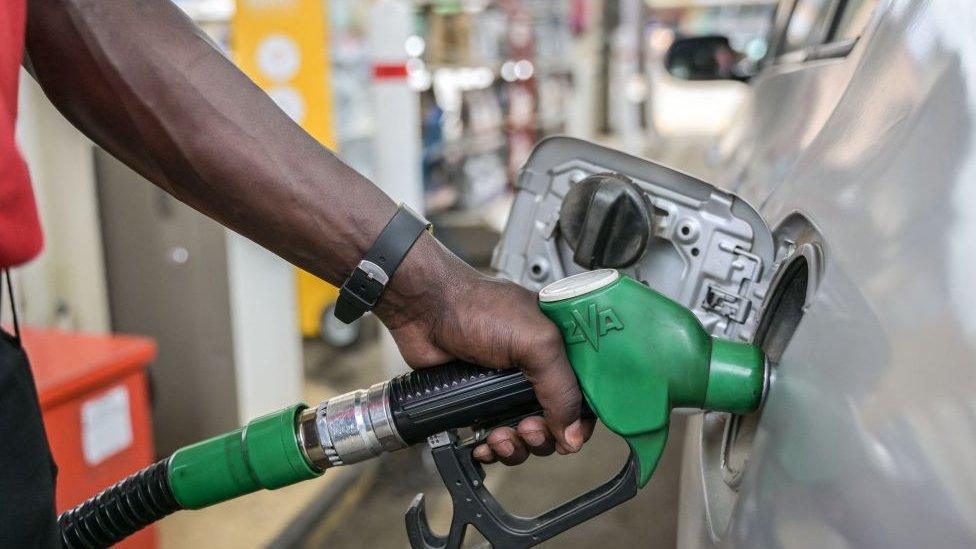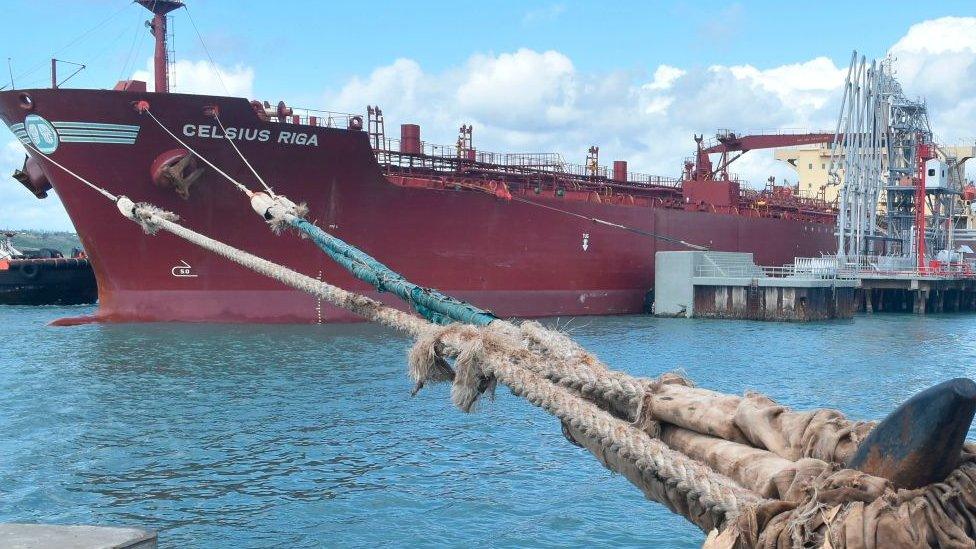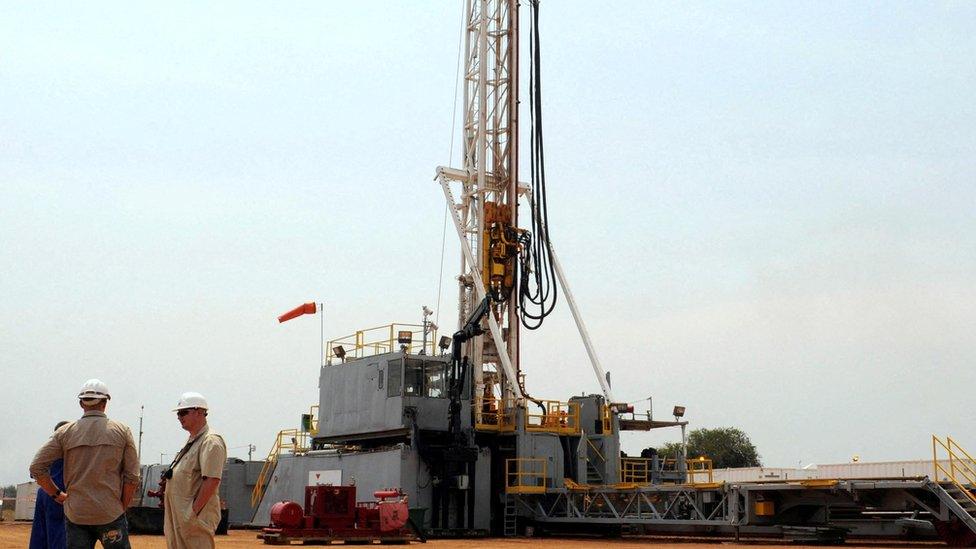How Kenya stands to lose from Uganda oil row
- Published

A bitter row over fuel supplies has erupted between Kenya and its landlocked neighbour Uganda, with the Ugandan leader saying his country is being "cheated" by "parasites" and middlemen.
For decades, Kenya has imported oil and sold it on to its East African neighbours - but its role as the main gateway for supplying fuel to the region is now at risk.
It all came to a head earlier this month when Ugandan President Yoweri Museveni accused Kenyan middlemen of inflating oil prices by up to 58%, causing a "huge loss" for his country.
He also hit out at "internal parasites" for "cheating" Uganda by failing to intervene since prices began to go up earlier in the year.
Uganda has for years imported 90% of its fuel from Kenyan oil marketing companies, which sell it to their Ugandan subsidiaries - the rest is procured through Tanzania.
Mr Museveni's attack came as the Ugandan parliament approved a decision to put a stop to this.
His government has made it clear that it wants more autonomy over future oil deals.
"Kenya has for decades decided what petroleum products Uganda buys, when, from where, how much, who buys and at what price," explained Ugandan Energy Minister Ruth Nankabirwa.
But Kenya's oil marketing companies have pointed the finger of blame for the recent high prices at the Kenyan government.
In the past, a tendering process by the various Kenyan companies was held. The firm with the winning bid would import the oil on behalf of the others. It was a pay-as-you-go operation transacted in US dollars.

Most of Uganda's oil moves arrives at the Kenyan port of Mombasa
But in March, the Kenyan government stepped in because of the country's shortage of US dollars, which led to difficulties for all businesses importing goods as banks were rationing dollars.
The government unilaterally negotiated a price with international oil companies to supply oil on credit for both the local and export market.
This arrangement means payments to the international suppliers are delayed by six months.
Under the deal, Kenyan oil marketing companies' local customers pay for their supplies in Kenyan shillings, but those in neighbouring countries pay in dollars.
All the money is kept in a high interest-earning account for six months before the bill is settled - easing the dollar-shortage burden.
John Njogu, the CEO of the Petroleum Outlets Association of Kenya, describes this as a "credit line" and he says such an arrangement makes the oil more expensive for buyers.
He told the BBC that Uganda was justified in rejecting it as it did not have a dollar-shortage problem and should not be expected to pay more.
With Uganda now opting out, Kenya will now find its dollar-shortage issue worsening - as Mr Njogu says Uganda pays $180m (£143m) a month to Kenyan firms for oil.
The deal has also come under attack from Kenyan opposition leader Raila Odinga, who described it as a "mega scam" - suggesting Kenyans are being made to pay higher prices while others, including some oil marketing firms, profit.
He wants Kenya's Ethics and Anti-Corruption Commission (EACC) to investigate the terms of the arrangement, which he said should be made public.
"The middle men President Museveni is talking about are Kenya government officials," he said.
But Kenya's Energy Minister Davis Chirchir has defended the credit deal, telling MPs that it has helped to cushion Kenyans from escalating fuel prices and external shocks.
Without it prices could be even higher, especially given the depreciating currency against the dollar, he said.
This war of words has coincided with a mysterious scandal in Kenya over the importation of 100,000 tonnes of oil worth $110m - the ownership of which has been disputed and a case is now in court.
The lawyer of the Kenyan businesswoman involved alleges she was abducted for several days by those wanting to "steal" the shipment.
Kenya's government denies involvement and has said her firm is unlicensed.
It is not only Kenyan consumers and Uganda's president who are unhappy. Burundi, the Democratic Republic of Congo, Rwanda and South Sudan also get a significant amount of their petroleum products through Kenya.
"The region is grumbling," Dzombo Mbaru, the CEO of Kenyan oil firm Mardin Energy, told the BBC.
He says it is not solely the new deal that is at fault, suggesting Kenyan taxes levied on all petroleum products could be a factor and needed a "critical review".
"The region is not asleep and it has aligned infrastructure projects to manage our dominance. It has options and in the long-run Kenya shall lose big time," Mr Mbaru warns.

Uganda is looking to begin producing its own oil in a few years
Uganda has already said it has reached a deal with Vitol Bahrain to finance the Ugandan National Oil Company's move to source and supply oil. It has also announced that it is to keep its reserve fuel stocks in Tanzania.
The infrastructure in Tanzania is not as developed as in Kenya, but with new partnerships this can change, Mr Mbaru says.
With Uganda soon to start producing its own oil and planning to build a refinery it will be able to provide "competitive petroleum products, free of [costs] caused by middlemen" within a few years to East Africa, he adds.
For Mr Njogu, Uganda's move is a needed wake-up call for Kenya's oil import industry: "We need to be more deliberate in being competitive and being more aggressive in earning business."
But it is a painful lesson that will seriously affect Kenya's economy for the foreseeable future, he says.
You may also be interested in: